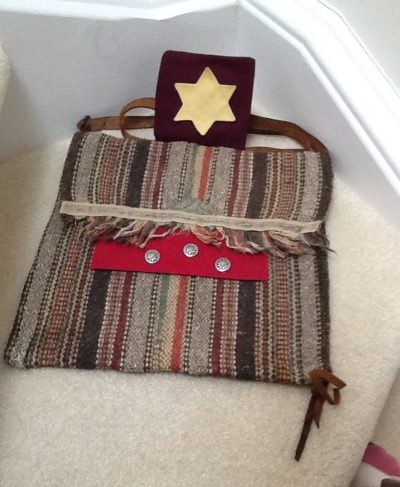[Click the photo for a larger image. Opens in a new window.]
Name of the exhibit: Surviving Reminders
Submitted by: Dora Goldman
Origin of the object: I, Dora Goldman (nee Neumann), was born in Mako, Hungary in 1933. In June 1944, along with most Hungarian Jews, my family (my mother, my brother, and myself) were rounded up by the fascist Hungarian government and we were deported from our home. From the town of Hódmezövásárhely, through the city of Szeged, the train’s ultimate destination was Auschwitz.
Our lives were spared when the train tracks were bombed out, and the train had to change its route. It ended up in Strasshof, Austria. We spent almost a year in a lager (work-camp) in a small village called Tribuswinkel bei Baden in Austria.
After the war, we returned to Hungary.
My father had lost his life in a forced-labour camp on the Eastern Front.
Description:
1) Yellow Star
The yellow star was made by my mother in Hódmezövásárhely, Hungary in March 1944. I had to wear this yellow star because I was born into a country and a time where anti-Semitism was not just an accepted social attitude, it was the law of the land. Every Jewish person in Hungary at that time had to wear it, as it was documented in following poem by Andras Mezei.
FROM AGE SIX ON by Andras Mezei
“Beginning on April the 5th
Every Jewish person over the age of six
—-without regard to gender—-
is obliged to wear a canary-yellow star
10x10cm in diameter, of cloth, silk or
velvet, clearly visible on the left chest.
The distinguished badge
has to be sewn on the garment
in a not easily removable way.
Non-compliance with the decree will be punished
by imprisonment of up to 6 months or internment.”
The decree marks the survivor to this day
in a not easily removable way.
Translated by: Marietta Morry
This decree followed me throughout my life.
2) Homespun bag from Hungary
Its date of origin is unknown. We carried our food in this bag throughout the Deportation. We were allowed to take three days of food supplies with us from the Ghetto.
3) Three buttons
The buttons are from Austria and were received in the winter of 1944-1945. A kind Austrian woman, named Anna, who worked with my mother in the work-camp, which was a suitcase factory, gave her a dress for me. She knew from my mother that we were in need of clothes as we had only been allowed to bring what was in our backpacks.
The dress is long gone, but I saved the buttons in memory of her kindness. The image on the buttons is the “edelweiss”, the flower of the Austrian mountains.
Voyage to Ottawa: I brought the yellow star, the homespun bag, and the buttons to Canada from Hungary in 1968.
Additional Information: András Mezei was an accomplished Jewish-Hungarian writer and poet. He survived the Holocaust as well as the three-month siege of Budapest. Throughout his long writing career, he returned repeatedly to the terrible experiences of his childhood; the voices of the Holocaust speak through Mezei’s verse.
Andras Mezei – “HATODIK ÉLETÉVTŐL” original poem in Hungarian
Andras Mezei – poetry in a newspaper
